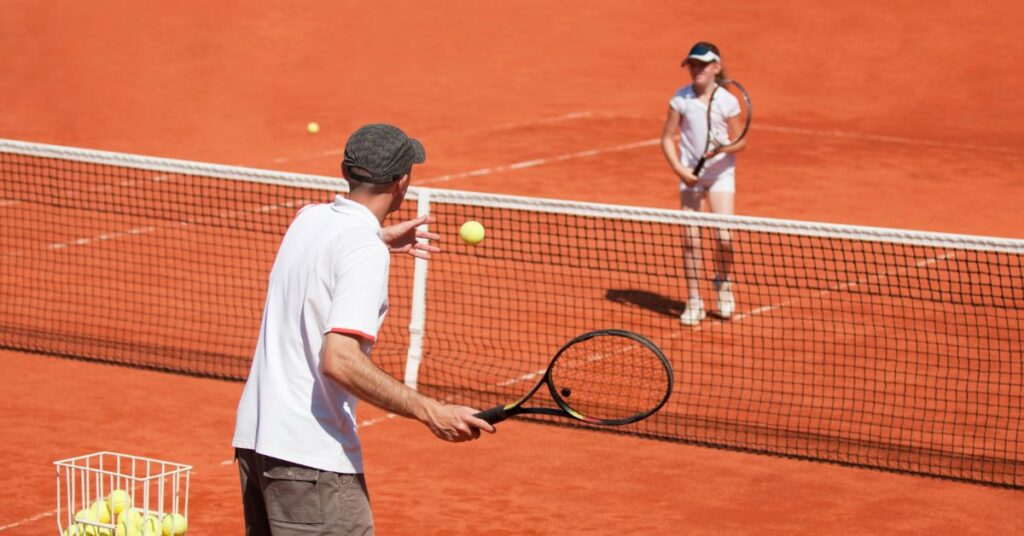When I first started competing seriously, I thought winning was all about hitting the hardest forehands and fastest serves. But after countless matches, I realized that mental training for tennis is what truly separates the winners from the rest. If you want to excel, you need to train not just your body, but your mind too.
In this post, I’ll share with you my personal experiences with mental training for tennis, why it’s crucial for all tennis players, and how you can start developing the mental strength needed to succeed.
Table of Contents for Mental Training for Tennis
Why Mental Training for Tennis Is Essential
You probably already know that mastering your strokes, fitness, and strategy are essential. But what about your mental and emotional training for tennis? When the pressure builds, it’s often your mental training for tennis that determines whether you crumble or stay strong.
I learned the hard way that it’s not enough to have good technique; your mental game must be just as sharp. Without mental toughness, even the best physical preparation can fall apart under stress. The mind controls the body, and in tennis, that truth becomes crystal clear.
Understanding the Mental Game
Before you can master mental training for tennis, you have to understand how important the mental game really is. It’s about staying focused on the next point, keeping emotions in check, and thinking clearly even when you’re physically exhausted.
You don’t just play against your opponent—you battle against your own doubts, fears, and distractions. I’ve experienced matches where I lost not because of my strokes, but because I lost my focus mentally.
Key Components of Mental Training for Tennis
Through trial and error, I’ve found that the following aspects are critical parts of mental training for tennis. Let’s break them down:
1. Building Mental Toughness
There’s no sugar-coating it: mental toughness is non-negotiable. I remember a crucial match where I was down 0-5 in the final set. Thanks to my mental training for tennis, I stayed calm, took it one point at a time, and eventually came back to win.
Toughness means staying positive when you’re down, bouncing back after mistakes, and believing in yourself no matter what.
2. Developing Focus
During matches, a hundred different things can distract you—the crowd, your last error, or even the scoreboard. Part of mental training for tennis is learning how to focus deeply on the present shot and the present point.
Whenever I start to drift mentally, I immediately remind myself to “control what I can right now,” and my performance improves instantly.
3. Emotional Control and Mental Resilience
Without emotional control, even the best players lose matches they could have won. I used to let one bad call derail an entire set. With consistent mental training for tennis, I learned how to recognise emotional triggers, breathe through them, and keep my mind steady.
Resilience allows you to lose a point, learn from it, and move on without carrying baggage into the next rally.
4. Having a Clear Plan
One of the best lessons I learned was to plan before stepping onto the court. Having a clear game strategy—knowing your strengths, your opponent’s weaknesses, and how to adapt—makes a huge difference.
Part of mental training for tennis is not just reacting, but entering a match with a thoughtful plan. Without it, it’s too easy to panic or become overwhelmed when the match gets tight.
Building a Mental Training Routine
Consistency matters. You don’t just train physically once a week and expect results, and the same applies to mental training for tennis. Here’s a sample routine I personally follow:
- Before Practice: Spend 5 minutes visualising key moments and successful outcomes.
- During Practice: Focus intensely on every point and practice handling tough situations mentally.
- After Practice: Journal reflections on your mental performance—what worked, what didn’t.
- Weekly Review: Identify specific mental areas for improvement.
Over time, I noticed that this commitment to mental training transformed not only how I played but how I thought during intense moments.
Practical Tips for Improving Your Mental Game
Let’s get practical. Here’s what I do, and what you can do too, to strengthen your mental training for tennis:
- Stay Present: Focus only on the next point. Don’t dwell on the past or worry about the future.
- Positive Self-Talk: Catch negative thoughts and immediately replace them with positive ones. Tell yourself, “I can win this point,” rather than “I’m blowing it.”
- Pre-Match Routine: Always have a solid warm-up routine that includes mental preparation like breathing exercises or visualisation.
- Learn from Mistakes: After each match, reflect on mental errors just like you would on technical ones.
- Breathe and Reset: Between points, use breathing techniques to calm your mind and refocus.
Challenges of Mental Training for Tennis
Believe me, mental training for tennis isn’t easy at first. It takes time and dedication, just like mastering a forehand or serve.
You’ll have days when your mind feels scattered or when nerves overwhelm you despite preparation. But that’s part of the process. Every tough moment is actually an opportunity to strengthen your mental muscles.
Think of mental training for tennis as an ongoing practice rather than a quick fix. It’s like strengthening any other skill—you need reps, patience, and persistence.
Common Mental Mistakes Tennis Players Make
When coaching or even just observing other players, I often notice mental mistakes that cost them matches:
- Overthinking: Instead of trusting their instincts, they second-guess every shot.
- Negative Self-Talk: Saying “I can’t do this” becomes a self-fulfilling prophecy.
- Losing Focus: Letting one bad point turn into a bad game, set, or match.
- Poor Preparation: Not having a clear plan for the match or not mentally rehearsing before stepping on court.
Awareness is the first step toward fixing these common errors. That’s why being proactive about mental training for tennis is crucial if you want to reach your full potential.
How Mental Training Enhances Your Entire Game
Here’s the thing: once you develop strong mental training for tennis, every part of your game gets better. Your strokes feel sharper because you’re not tense. Your strategies become clearer because you can think calmly under pressure. You anticipate better because your mind is free from distractions.
When you trust yourself, stay positive, and remain focused, you tap into your best level of play more often. That’s what every serious player is striving for—and you can achieve it.
More on Mental Training for Tennis
How to Mentally Prepare for a Tennis Match?
When I’m getting ready for a tennis match, the first thing I do is focus on the mindset I want to bring onto the court. It’s easy to get caught up in the pressure or the importance of the match, but I’ve learned that a calm, focused attitude makes all the difference.
The night before, I make sure I get a good night’s sleep, knowing I’ll need all my energy. Then, on the day of the match, I take some quiet time to clear my mind—whether it’s a quick meditation, deep breathing, or just a few minutes of being alone to visualise the match.
As I step onto the court, I remind myself to focus only on the present. I’m not thinking about the score, the opponent, or what I have for dinner later. Instead, I narrow my focus to one point at a time, ready to give my best shot. Confidence plays a huge role here too—I’ve learned to trust my preparation and experience, knowing that I’m as ready mentally as I am physically.
What Are the Psychological Skills Training in Tennis?
Psychological skills training in tennis is about strengthening the mental game, and I’ve found that these skills can be just as valuable as perfecting my backhand. The key areas I focus on are focus, confidence, resilience, and emotional control.
- Focus: This is about being able to shut out distractions, whether it’s the crowd, your opponent’s behavior, or even your own nerves. For me, training my ability to stay mentally present during each point is huge.
- Confidence: Tennis can be a game of ups and downs, and I’ve learned that trusting my own abilities is crucial. I’ve worked on strategies to build confidence, like using positive self-talk and visualizing success before matches.
- Resilience: There will always be moments when things don’t go your way, but learning to bounce back is vital. When I miss an easy shot or drop a set, I remind myself to stay in the game and focus on the next point.
- Emotional Control: Staying calm under pressure is a skill I’m always working on. It’s about staying grounded even when things get heated—something I continually practice with breathing exercises.
Through psychological skills training, I’ve learned to train my brain just like I train my body. It’s all about strengthening the way I think and react on the court.
How to Overcome a Mental Block in Tennis?
We’ve all had those moments in tennis when we’re on the court, and everything feels wrong—whether it’s missing easy shots, feeling like our mind is racing, or getting frustrated at ourselves. When that happens to me, it’s clear that I’m dealing with a mental block.
Here’s what I do to get past it: First, I acknowledge it. I don’t pretend that the block doesn’t exist. Then, I take a few deep breaths and reset. This might mean walking around the baseline for a second or two, taking a sip of water, and shaking off the frustration.
Next, I remind myself that tennis is just a game. It’s not life or death. I focus on one point at a time, eliminating the need to “fix” everything at once. I also try to adjust my expectations—there’s no rush to “get back on track” immediately. Sometimes, I’ll even switch up my game plan for a while, doing something that feels comfortable and easy, like hitting more high percentage shots, just to break the cycle.
Sometimes, it’s just about taking the pressure off yourself and allowing the game to flow naturally again.
How Do You Mentally Reset in Tennis?
Mentally resetting in tennis is one of the most important skills I’ve developed over the years. You can’t let mistakes from earlier in the match linger in your mind because they’ll only hold you back. When I find my focus slipping, I use a few key methods to bring myself back to the present.
First, I take a breath—deep, slow inhales and exhales. It sounds simple, but it works wonders in clearing the mental clutter. Sometimes, I’ll even say to myself “reset” while I breathe to remind myself that the previous point is done, and I have a fresh opportunity ahead.
If I’m really feeling mentally scattered, I’ll go to my routines. I’ll focus on the feeling of the racket in my hand, the texture of the ball, or how my feet feel on the court. It’s like a quick grounding technique that shifts my mind from the anxiety of mistakes to the present moment.
I also find it useful to switch up my tactics if I feel mentally stuck. If I’m struggling with consistency, I’ll go for safer shots or rely on my serve to regain control. A small tactical change helps me shift my mental focus away from worrying about mistakes and back to playing the game.
Most importantly, I remind myself that every match is a new point, a new challenge, and a chance to reset—mentally and physically.
Final Thoughts: Take Charge of Your Mind Today
If you truly want to improve your performance, remember that mental training for tennis is just as critical as physical practice. Every time you work on your mental skills, you’re investing in the future champion within you.
I’m still working on my mental training for tennis every day, and trust me—it’s a journey worth taking.
Start today. Build mental strength one point at a time, believe in yourself, and take your game to heights you once only dreamed about. Struggling to control your nerves & emotions? Visit this.








